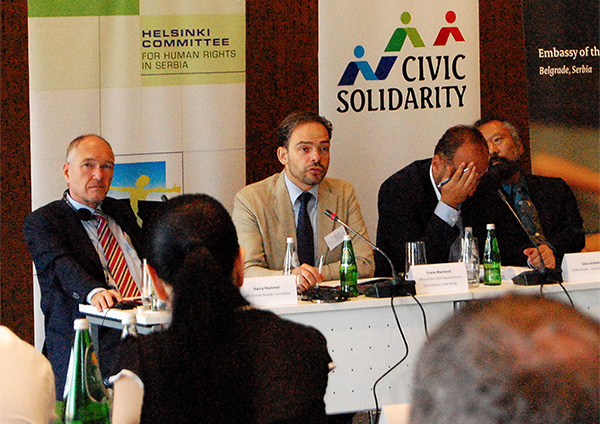Project: Monitoring Serbia’s OSCE Chairmanship20Jul2015
Freedom of Expression, Media Freedoms and (Self) Censorship in the OSCE Area
 Freedom of expression is the subject of numerous controversies within many countries in the OSCE area, affecting not only governance, but the broader society. Various forms of denying or limiting freedom of expression and media freedoms exist in the OSCE region, including jeopardizing freedom of journalists and other media workers but also human rights activists and others who express opinions critical of the authorities. The groups not appreciated or considered unconventional by mainstream opinion too easily fall victim to old and new forms of intolerance, racism and xenophobia.
Freedom of expression is the subject of numerous controversies within many countries in the OSCE area, affecting not only governance, but the broader society. Various forms of denying or limiting freedom of expression and media freedoms exist in the OSCE region, including jeopardizing freedom of journalists and other media workers but also human rights activists and others who express opinions critical of the authorities. The groups not appreciated or considered unconventional by mainstream opinion too easily fall victim to old and new forms of intolerance, racism and xenophobia.
The goal of the conference is to raise awareness on how to best promote and bolster freedom of expression and media freedoms, and counter (self) censorship. The aim is to identify concrete mechanisms to this goal, to explore which media legislation, policies and practices best contribute to an open, informed society and healthy accountability of governments. There are numerous challenges to adjust to changing market, technological and social trends, in a manner, which will preserve both freedom of expression and media plurality. Particularly pressing are problems related to the media financing and ethical standards. However, an active, robust and diverse media sector, both in terms of ownership and in content, is a key prerequisite for any modern democratic society.
The conference will pay specific attention to legislation and policies in the Western Balkans region, where in addition to OSCE commitments and recommendations of the Representative of Freedom of the Media the requirements of harmonization with EU standards play a major role. Additionally, the conference aims to stimulate the Serbian government to prioritize freedom of expression issues during its Chairmanship, both inside Serbia and in the implementation of its Chairmanship.
The conference builds upon the December 2014 Basel Declaration of the Civic Solidarity Platform on intolerance, discrimination, and hate crimes, which asks for guidelines for states “on combatting hate speech in the media and the internet as well as by public officials and politicians, while also upholding freedom of expression”.
The conference outcomes will also serve as input for a Belgrade Declaration on Freedom of Expression, planned for adoption by the Civic Solidarity Platform in December 2015, which is also aimed at the future OSCE Chairmanships, beginning with Germany in 2016.



